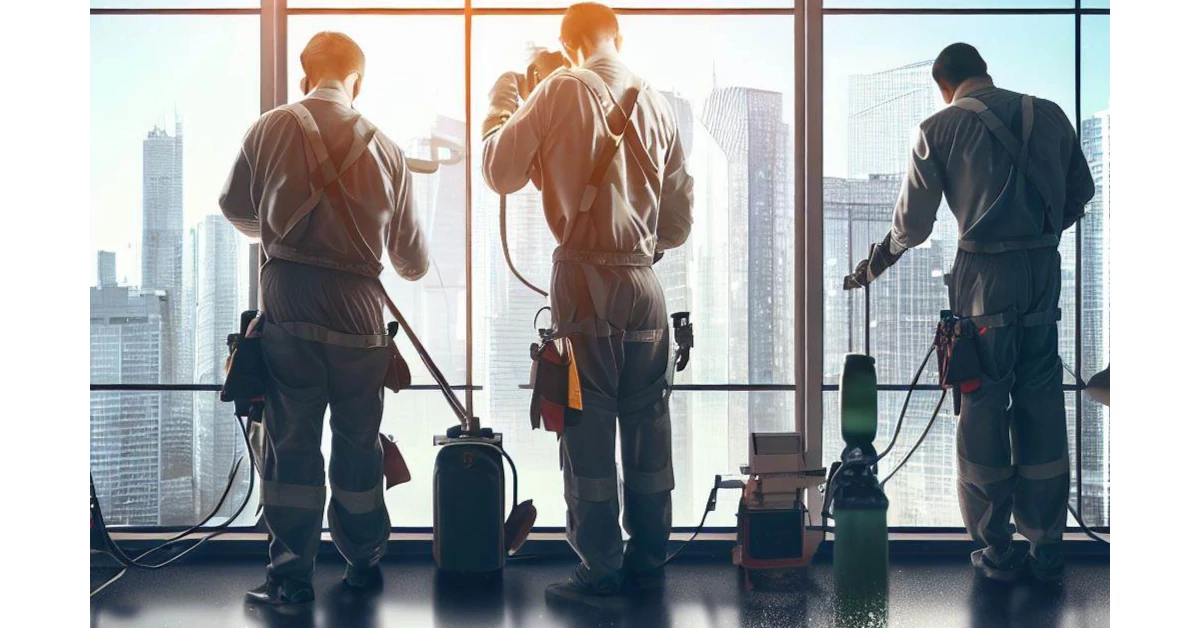As a window cleaner, you know what it’s like to work high up.
But being high up comes with a lot of risks, so it’s important to be ready for any kind of emergency.
Anything can happen at any time, from sudden gusts of wind to equipment that doesn’t work.
Because of this, knowing how to handle an emergency is not just important, it’s essential.
In this article, I’ll talk about the most important emergency steps that every window cleaner should know to keep themselves and those around them safe.
So, get ready to buckle up and learn how to handle any emergency like a pro!
Window Cleaning Safety

Hazards Associated with Window Cleaning
Some of the most common dangers of window cleaning are falls from height, the use of chemicals, the condition of the equipment, obstacles on the ground and in the air, suspension rigging and anchor points, and electric supply lines.
Falls from height are one of the main reasons why people die on the job in the UK, and many more people get hurt, sometimes seriously.
People still use ladders a lot, but the risks are still there, so people are still likely to fall and drop things.
Another risk of window cleaning is the use of chemicals.
When using chemicals, you may need to wear rubber or neoprene gloves, glasses or goggles, or a respirator.
The state of the equipment is also a risk, so it’s important to make sure it’s in good shape before using it.
When planning a window cleaning job, you should also think about obstacles on the ground and in the air, suspension rigging and anchor points, and power lines.
Preventing Accidents and Injuries
It’s important to plan ahead before each shift to avoid accidents and injuries.
Planning stops accidents from happening, and not planning is the same as planning to fail.
A written work plan should be made that includes equipment, training, and a site assessment, among other things, to prevent accidents and injuries on the job.
Doing a window cleaning risk assessment is also a key way to keep yourself, your employees, and the people who work or live at the job site safe.
A window cleaning risk assessment has five steps: finding the risks, figuring out who could be hurt and how, evaluating the risks and deciding what precautions to take, writing down the results, and reviewing the assessment and making changes if needed.
Necessary Safety Equipment
Cleaning windows is a dangerous job that needs safety gear to keep people from getting hurt or hurting themselves.
Personal Protective Equipment (PPE) is important for window cleaners.
This includes protective clothing and shoes, gloves, hard hats, safety helmets, and high visibility clothing.
Window cleaners must also wear hard hats, protective jackets, and eye protection.
When there is no passive fall protection, you need active fall protection equipment.
This is usually made up of a full-body harness, lanyard, rope grab, and lifeline.
Safety equipment does not include basic cleaning tools like buckets, sponges, squeegees, hand dishwashing liquid, and lint-free rags or small towels.
When cleaning the windows of a high-rise building, you must have safe and useful tools and equipment.
Good window cleaning tools don’t cost very much, and you don’t need to spend a lot of money on fancy tools or special cleaners because the most basic ones work just as well.
Employer Responsibilities
Employers must make sure their workers are safe when they are working at heights.
They must give window cleaners the right safety gear to make sure that the jobs they do don’t put them in dangerous situations.
When making sure that professional window cleaners are safe, window cleaning companies must check the working conditions and make sure that the tools or materials used are important parts.
Employers must also make sure that their workers get the right training in a language that they can fully understand.
Cleaning windows can be a dangerous job, but accidents and injuries can be avoided with the right safety gear and procedures.
To stay safe on the job, it’s important to plan ahead, do a risk assessment, and use the right safety gear.
Employers must also be responsible for their workers’ safety and make sure they have the right training and tools.
Window cleaners can stay safe and avoid accidents and injuries by following these rules.
Preventing Falls While Cleaning Windows
Window Cleaning: Safety Precautions and Emergency Procedures
Window cleaning is a job that needs to be done with care and safety in mind.
Working at a high level can be dangerous, but you can avoid falling by using the right equipment, like a safety harness.
But if you can avoid it, it’s best not to work up high.
For example, you could use telescopic water-fed poles or clean windows from the inside.
Falls often happen when people use portable ladders, so it’s important to make sure the ladder is stable.
Cleaning from the inside can get rid of the risk of falling and should be considered when the design of the window makes it safe to do so.
Types of Window Cleaning Operations
To avoid falling, it’s important to follow best practices and guidelines for putting together, using, maintaining, and inspecting any equipment used to clean windows.
Depending on the type of window cleaning job, workers may face different safety and health risks.
There are two types of window cleaners: those who work on the ground and those who work in the air.
When you do work on the ground, you clean windows from the ground.
When you do work in the air, you clean windows from a platform in the air or by using a rope.
No matter what kind of tools and equipment are used on the job, the boss must make sure that everything is checked and fixed before it is used.
The employer must also make sure that employees are properly trained in a language they fully understand.
Chemical Exposure and Weather Conditions
Window cleaners may also be exposed to chemicals in the cleaning products they use.
It is important to know what chemicals will be used and to wear the right personal protective equipment (PPE).
When cleaning windows in the fall, you need to be aware of the extra challenges and risks that come with the season.
When it’s raining, it can be hard to clean windows, so it’s best to wait until the weather clears up.
If you have to clean, it’s best to only clean the windows on the first floor and wear the right clothes, like a waterproof shell, to stay dry and warm.
Emergency Procedures
Cleaning windows can be a dangerous job, so it’s important to take precautions to avoid getting hurt.
In an emergency, like if someone gets poisoned by window cleaner, you should call 911 or your local emergency number right away.
For more information, you can also call the Poison Control Center at 1-800-222-1222 or your local poison control center.
Health care professionals should give the first aid for window cleaner poisoning.
Falls from height are the most common dangers of cleaning windows.
Safety training is the first important step in reducing the number of accidents that happen when people clean windows.
When working at a high level, it’s important to use the right safety gear, like safety harnesses, to keep from falling.
It is also important to plan and organize the task ahead of time, taking into account the working conditions and equipment needed to get to the area.
If you have to work at a height, you should first think about using a safe place that is already there, like cleaning from inside windows or a balcony.
Your boss must make sure that cleaning windows is done in a safe way to keep workers and the public safe and healthy.
By following safety rules and best practices, you can avoid accidents and injuries and know what to do in case of an emergency.
Safety Regulations: Ensuring Safe Emergency Procedures in Window Cleaning
When it comes to window cleaning, safety regulations are crucial to ensure that emergency procedures are carried out safely and effectively.
Window cleaning involves working at heights, which poses a significant risk to the cleaners’ safety.
Therefore, it is essential to follow safety regulations to prevent accidents and injuries.
Safety regulations cover various aspects of window cleaning, including the use of appropriate equipment, training of personnel, and adherence to safety protocols.
For instance, window cleaners must use safety harnesses, ropes, and other protective gear to prevent falls.
They must also be trained on how to use the equipment and follow safety protocols to minimize risks.
In conclusion, safety regulations are essential in window cleaning to ensure that emergency procedures are carried out safely and effectively.
By following safety regulations, window cleaners can minimize the risks of accidents and injuries, making the workplace safer for everyone involved.
For more information:
Window Cleaning Safety Regulations: Hazards, Equipment & Best Practices

Types of Window Cleaning Methods
Methods for Cleaning Windows
There are different ways to clean windows, and each one has its own pros and cons. Some of the most common ways to do this are:
- Traditional squeegee and bucket method: This is one of the oldest and most popular window cleaning techniques. It involves using a squeegee, soap, water, and a bucket to clean windows thoroughly. This method is cost-effective, easy to use, and able to reach areas that are difficult to access.
- Water fed pole system: This method uses high-power purified water for a soap-free clean. This method is used by Fish Window Cleaning, a company that specializes in both residential and business cleaning services.
- Wash and Wax Formula: Window Gang uses a unique “Wash and Wax Formula” for its services, which leaves an invisible layer behind to repel pollen, dirt, and other buildup.
DIY Window Cleaning
If you want to clean your windows yourself, you’ll need a few basic tools.
Some of these are a sponge or scrubber, a bucket, dish soap, rags or small towels without lint, and a squeegee.
With the sponge or scrubber, you can clean the glass, and with the squeegee, you can wipe the glass clean.
If the windows are hard to reach, you may also need a ladder and something to hold the ladder steady.
Tips and Tricks for Cleaning Windows
There are a number of tips and tricks that can help you clean windows like a pro. These things are:
- Using a sponge mop and a long-handled squeegee can make windows look like they were cleaned by a professional.
- Using a window cleaning solution that leaves no streaks can help avoid unsightly stains.
- When cleaning outside windows, it is important to follow safety protocols to avoid accidents.
Frequency of Cleaning Windows
How often you should clean your windows depends on a number of things, like where your house is, if there are trees and pollen nearby, and what the weather is like.
For homes, it’s best to clean the windows at least twice a year.
However, if the house is on a busy street or in an area with a lot of trees and pollen, it might be necessary to clean the windows three times a year.
It’s best to clean windows more often on commercial properties, at least once a month for retail spaces and restaurants.
But commercial buildings or offices should have their windows cleaned at least twice a year.
Cleaning Window Screens
When cleaning windows, it’s also important to clean the window screens, because dirt on the screens can end up on the windows after it rains.
When the windows are open, less dust, dirt, and pollen will come into the house if the screens are clean.
It’s best to clean the inside and outside of your windows twice a year, with extra touches or washes for the outside windows due to things like pollen, raindrops, trees that make sap, and birds.
Benefits of Hiring a Professional Window Cleaning Service
Why Hire a Professional Window Cleaning Service?
There are a number of good reasons to think about hiring a professional window cleaning service.
Here are some reasons why you might want to hire an expert:
- Better Results: Professional window cleaners have the right tools, knowledge, and experience to deliver a high-quality service that can provide better results than cleaning windows on your own.
- Saves Time and Effort: Window cleaning is labor-intensive and can be hard to do by yourself, especially if you have a multi-story house. Hiring a professional can save you time and effort.
- Extends the Life of Your Windows: Professionals can remove corrosive contaminants that can eat away at the seals and identify potential problems, which can help extend the life of your windows.
- Enhances Your Home’s Appearance: Clean windows reflect natural light more distinctly, making your home look more beautiful.
Additional Services Offered by Professional Window Cleaning Companies
Professional window cleaning services may also offer other services, like cleaning gutters, power washing, and fixing screens.
They can also take care of all the annoying extras, like cleaning the windowsills and vacuuming up dead bugs.
How to Find a Good Professional Window Cleaning Service
It’s important to find a good service to clean your windows for you.
Here are some tips to help you find the best window cleaning company for your needs:
- Look for a licensed and insured cleaning company with a great reputation.
- Check online reviews, ask friends and family for references, and look at the Better Business Bureau report.
Tips and Tricks for Cleaning Windows Without Leaving Streaks
It can be hard to clean windows without leaving streaks, but there are a number of tips and tricks that can help you get a streak-free shine.
Here are a few things to think about:
- Avoid using glass cleaners that are based in ammonia or alcohol, as they can leave streaks and even a thin film that attracts dust and moisture.
- Use a homemade window cleaner made of one part distilled vinegar to 10 parts warm water in a spray bottle.
- Use the right tools, such as a microfiber cloth or a squeegee, to get a streak-free shine.
- Rubbing from multiple directions can also help avoid streaking.
- Rinse with clear water to help remove any remaining cleaning solution.
- Buff out any remaining streaks with a dry microfiber cloth or newspaper.
Cleaning Solutions for Different Types of Windows
Choosing the Right Cleaning Solution
Different kinds of windows can be cleaned with different kinds of cleaning solutions.
Windex is the most popular way to clean because it can get rid of grease and food stains on a wide range of surfaces without leaving spots or streaks.
But you shouldn’t use ammonia- or alcohol-based glass cleaners because they can leave streaks or make a film that makes water or dust stick to the glass.
If you’d rather use a natural cleaner, you can make your own by mixing one cup of white vinegar with 10 cups of water.
You can put this solution in a spray bottle and use it later.
Warm water mixed with a few drops of dishwashing soap is another natural way to clean.
Using the Right Equipment
It’s important to use the right tools when you clean windows.
You will need a blade, a scrubber or sponge, and a 10 or 12-inch squeegee.
For both the inside and outside of windows, you should use a non-abrasive cleaner, soap, water, and a vacuum with a soft brush and drapery attachments.
For commercial jobs, window washers usually use soapy water and a squeegee.
But this is not a good way to clean most places inside your home.
You can instead use a soft towel or microfiber cloth, a glass cleaner that contains vinegar, and a small squeegee, if you like.
Maintaining Cleanliness Between Cleanings
There are a few easy steps you can take to keep your windows clean between cleanings.
First, use a small broom or vacuum to clean the window frames and sills of dirt and other debris.
Use cleaning wipes or a cloth soaked in a cleaning solution to wipe down frames and sills made of plastic or vinyl.
Second, use a soft cloth or sponge to clean the glass so you don’t scratch it.
Spray the cleaner on a cloth, and then use the cloth to clean the glass.
This way, you won’t get the cleaner on the window frame or sill.
Third, after cleaning the window with soapy water, rinse it with plain water to get rid of any soapy water residue and streaks.
Fourth, don’t spray too much cleaner at once.
Instead, work from the top of the glass to the bottom in small sections.
Additional Tips for Year-Round Clean Windows
There are also some other suggestions for keeping windows clean all year.
At least once a month, clean your windows to keep them free of streaks.
Use a solution of vinegar and water to clean your windows.
This is better for the environment and less expensive than store-bought cleaners.
You should also clean the window frames and sills, as they can get just as dirty as the windows.
To clean the frames and sills, use a scrub brush or an old toothbrush.
Lastly, don’t clean windows on a sunny day because the sun can dry the window washing fluid too quickly, leaving streaks and residue.
Conclusion

When it comes to window cleaning safety, emergency plans are very important.
It’s important to always be ready for the worst-case scenario and have a plan to make sure everyone’s safety.
But it’s also important to think about what caused these crises in the first place.
Do we do enough to stop accidents from happening in the first place? Are we giving our window cleaners the right training and tools? We need to ask ourselves these questions if we want to make the window cleaning business safer.
Let’s not just think about what to do in an emergency, but also about what we can do to keep our workers safe.
Always remember that safety should come first.
Looking for a new Magnetic window cleaner?
Choosing a gadget can be very difficult if you know nothing about the technology.
Some will pay for features they do not need while others may not consider what they really want.
So I created this quick, newbie guide to help you focus on what is really important to you:
The Best Magnetic Window Cleaner (For You!)
Links and references
- Health Hazards Workbook by OSHA
- First Aid Guide for School Emergencies by MESD School Health Services
- Guidelines for Chemical Laboratory Safety in Secondary Schools by American Chemical Society
- Safety Handbook by Northwest Missouri State University
- Cal/OSHA Pocket Guide for the Construction Industry
My article on the topic:

